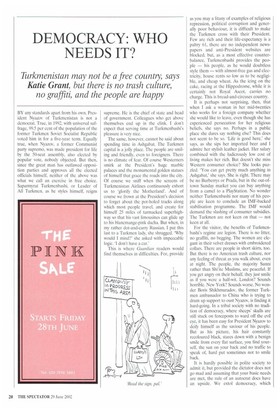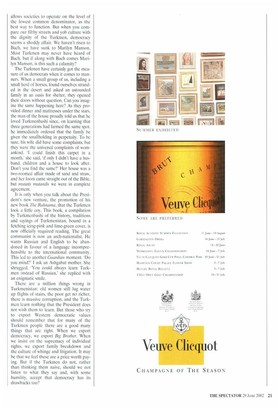DEMOCRACY: WHO NEEDS IT?
Turkmenistan may not be a free counny, says Katie Grant, but there is no trash culture, no graffiti, and the people are happy
BY any standards apart from his own, President Nyazov of Turkmenistan is not a democrat. True, in 1992, with universal suffrage, 99.5 per cent of the population of the former Turkmen Soviet Socialist Republic voted him in for a five-year term. Equally true, when Nyazov, a former Communist party supremo, was made president for life by the 50-seat assembly, also elected by popular vote, nobody objected. But then, since the great man has outlawed opposition parties and approves all the elected officials himself, neither of the above was what we call an exercise in free choice. Saparmyrat Turkmenbashi, or Leader of All Turkmen, as he styles himself, reigns supreme. He is the chief of state and head of government. Colleagues who get above themselves end up in the clink. I don't expect that serving time at Turkmenbashi's pleasure is very nice.
The same, however, cannot be said about spending time in Ashgabat. The Turkmen capital is a jolly place. The people are smiling and friendly, even to foreigners. There is no climate of fear. Of course Westerners smirk at the President's huge marble palaces and the monumental golden statues of himself that grace the roads into the city. Of course we sniff when the screens of Turkmenistan Airlines continuously exhort us to 'glorify the Motherland'. And of course we frown at the President's decision to forget about the pot-holed tracks along which most people travel, and create for himself 25 miles of tarmacked superhighway so that his vast limousines can glide up to his blancmange-pink dacha. But when, in my rather dot-and-carry Russian, I put this last to a Turkmen lady, she shrugged. 'Why would I mind?' she asked with impeccable logic. 'I don't have a car.'
This is where Guardian readers would find themselves in difficulties. For, provide
as you may a litany of examples of religious repression, political corruption and generally poor behaviour, it is difficult to make the Turkmen cross with their President. Few are rich and their life-expectancy is a paltry 61, there are no independent newspapers and anti-President websites are blocked, but, as a most effective counterbalance, Turkmenbashi provides the people — his people, as he would doubtless style them — with almost-free gas and electricity, house rents so low as to be negligible, and cheap wheat. As the icing on the cake, racing at the Hippodrome, while it is certainly not Royal Ascot, carries no charge. This is bread-and-circuses country.
It is perhaps not surprising, then, that when I ask a woman in her mid-twenties who works for a foreign company whether she would like to leave, even though she has experienced persecution for her religious beliefs, she says no. Perhaps in a public place she dares say nothing else? This does not seem to be so. 'Life is good here,' she says, as she sips her imported beer and I admire her stylish leather jacket. Her salary combined with the ludicrously low cost of living makes her rich. But doesn't she miss Western consumer choice? She looks puzzled. 'You can get pretty much anything in Asiagabat,' she says. She is right. There may he no Burberrys or Prada, but in the out-oftown Sunday market you can buy anything from a camel to a PlayStation. No wonder neither Turkmenbashi nor many of his people are keen to conclude an IMF-backed stabilisation programme. The IMF would demand the slashing of consumer subsidies. The Turkmen are not keen on that — not keen at all.
For the visitor, the benefits of Turkmenbashi's regime are legion. There is no litter, no graffiti, no begging. The women are elegant in their velvet dresses with embroidered collars. There are people in short skirts, too. But there is no American trash culture, nor any feeling of threat as you walk about, even at night. The people, the majority Sunni rather than Shi'ite Muslims, are peaceful. If you get angry on their behalf, they just smile as if you were a half-wit. London? Sounds horrible. New York? Sounds worse. No wonder Boris Shikhmuradov, the former Turkmen ambassador to China who is trying to drum up support to oust Nyazov, is finding it hard-going. In a tribal society with no tradition of democracy, where sheeps" skulls are still stuck on fenceposts to ward off the evil eye, it has been easy for President Nyazov to deify himself as the saviour of his people. But as his picture, his hair constantly recoloured black, stares down with a benign smile from every flat surface, you find yourself, the sun on your back and no traffic to speak of, hard put sometimes not to smile back.
It is hardly possible in polite society to admit it, but provided the dictator does not go mad and assuming that your basic needs are met, the rule of an autocrat does have an upside. We extol democracy, which allows societies to operate on the level of the lowest common denominator, as the best way to function. But when you compare our filthy streets and yob culture with the dignity of the Turkmen, democracy seems a shoddy affair. We haven't risen to Bach, we have sunk to Marilyn Manson. Most Turkmen may never have heard of Bach, but if along with Bach comes Marilyn Manson, is this such a calamity?
The Turkmen have certainly got the measure of us democrats when it comes to manners. When a small group of us, including a small herd of horses, found ourselves stranded in the desert and asked an astounded family in an oasis for shelter, they opened their doors without question. Can you imagine the same happening here? As they provided dinner and mattresses under the stars, the man of the house proudly told us that he loved Turkmenbashi since, on learning that three generations had farmed the same spot, he immediately ordered that the family be given the smallholding in perpetuity. To be sure, his wife did have some complaints, but they were the universal complaints of womankind. 'I could finish this carpet in a month. she said, `if only I didn't have a husband, children and a house to look after. Don't you find the same?' Her house was a two-roomed affair made of sand and straw, and her loom came straight out of the Bible, but mutatis mutandis we were in complete agreement.
It is only when you talk about the President's new venture, the promotion of his new book The Ruhnama, that the Turkmen look a little coy. This book, a compilation by Turkmenbashi of the history, traditions and sayings of Turkmenistan, bound in a fetching icing-pink and lime-green cover, is now officially required reading. The great communist is now an arch-nationalist. He wants Russian and English to be abandoned in favour of a language incomprehensible to the international community. This led to another Guardian moment. 'Do you mind?' I ask an Ashgabat mother. She shrugged. 'You could always learn Turkmen instead of Russian.' she replied with an enigmatic smile.
There are a million things wrong in Turkmenistan: old women still lug water up flights of stairs, the poor get no richer, there is massive corruption, and the Turkmen learn nothing that the President does not wish them to learn. But those who try to export Western democratic values should remember that for many of the Turkmen people there are a good many things that are right. When we export democracy, we export Big Brother. When we insist on the supremacy of individual rights, we export family breakdown and the culture of whinge and litigation. It may be that we feel these are a price worth paying. But if the Turkmen do not, rather than thinking them naive, should we not listen to what they say and, with some humility, accept that democracy has its drawbacks too?



































































 Previous page
Previous page